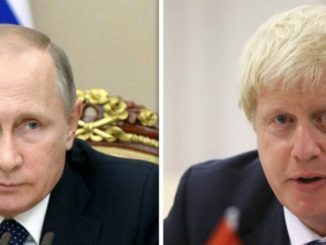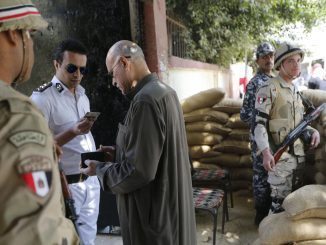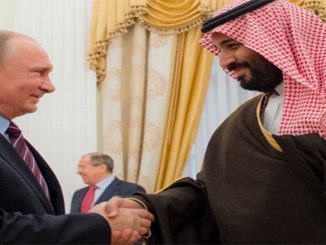
BY: Iyad Walid*
There are predictions that the year ‘2017’ may carry political changes and transformations in the Middle East region, which has actually witnessed quality leaps over the past five years.
The Middle East region, especially the conflict zones, has seen unprecedented strategic dynamics and geopolitical transformations during the period from 2011 to the end of 2016, including the eruption of revolutions, bloody confrontations between regular military militias and other artificial ones. The region has also witnessed sectarian and confessional wars that resulted in killing more than 300 thousand people and the emergence of the largest number of refugees worldwide, i.e. more than seven million refugees, according to the assessment of the UN Commission for Refugees. During the same period, there have also been military coups in more than one country in the region, as well as severe economic crises, where some countries have become close to bankruptcy. Furthermore, a number of regional countries turned into a “nucleus” (of a country) or even a clear example of a failed state, after it had been a model of the solid central state throughout its history.
All this and more does not suggest that the Middle East is on the verge of stability, or at least “relative stillness” that could induce some developments which may indicate a state of stability with the advent of the new year ‘2017’.
The fact is that there are three developments in the international and regional arena that may have an impact on the formation of a political vision for the future of the Middle East during 2017, namely:
First: the access of Donald Trump to the White House, as well as a new political administration from the Republican Party and a parliamentary majority that would allow easy movement and maneuver in international policy, particularly in the Middle East that the US is interested in.
Second: The Turkish-Russian agreement on the future of Syria.
Third: The economic crises in all the countries of the region.
A review of the major Middle East countries can show that most of the regional countries will continue the state of uncertainty in their unstable political and economic situation, though some areas are expected to undergo more crises during 2017.
Turkey and further internal and external challenges
There is no doubt that Turkey has passed through a state of a rapid economic boom, and assumed a unique political position which made it a pivotal and major country in determining the Middle East policies.
However, Turkey was exposed last year to a failed coup attempt, followed by a series of bombings in several provinces and sensitive areas. Also, it launched Operation Euphrates Shield which is an open war on Turkey’s border with Syria. Accordingly, Turkey started to suffer from economic crises – that have become publicly known – such as the decline in the value of the Turkish national currency against the US dollar, and the significant drop in tourism, especially in the last quarter of 2016.
But undoubtedly, in spite of all these challenges, Turkey will continue to be a major player and a representative of the Muslim Sunnis in the face of the Shiite axis represented by Iran. Accordingly, the pressures will increase and competition is bound to erupt on several fronts, even though it could be an unannounced competition “under the table”.
The presidential system
It is also expected that Turkey will enter a crucial phase in its history by next spring, the first such shift in its modern history, namely the transition to a presidential system, as a substitute for its current parliamentary system. Undoubtedly, this will lead to further internal tension, particularly with the Republican People’s Party – a Kemalist, social liberal and a social-democratic political party, which is the main opposition party in Turkey now – and some of the secularist political elites who are backed from abroad.
A Turkish-ISIS open confrontation
Turkey will also enter an open confrontation with the Islamic State in Iraq and Syria (ISIS) organization which considers Turkey a clear enemy, especially after the Turkish Operation Euphrates Shield and Turkey’s narrowing the grip on the organization. Perhaps the latest developments of such a confrontation appeared in ISIS’s announcement in an official statement that it was responsible for the Istanbul nightclub attack during the early hours of the new year, killing 39 people of different nationalities, according to the Turkish government.
Turkey-Russia Rapprochement
The state of Turkish-Russian rapprochement, particularly on the Syrian crisis, and both parties’ decision to take over the reins of the issue and determine its fate, has led the new US administration to seek further rapprochement with the Turkish side, contrary to what used to happen during the Obama administration. However, the United States may even try to “disturb” the Turkish-Russian harmony.
The gap between Turkey and the EU is also expected to increase. However, Turkey will use the illegal immigration card more clearly in the face of Europe to form more pressure on the European Union.
The decline in the Turkish lira against the US dollar cannot in any way be controlled in light of the internal and external political challenges, and this would form a burden on Erdogan, who is seeking with full force to reach the presidential system, while he is fighting on several internal and external fronts at the same time.
Syria stepping quickly towards division
The year ‘2017’ will not be better than its predecessor with regard to the Syrian crisis, which is entering its sixth year while it is much more fractured and fragmented.
The recent shift of Aleppo’s fall in the hands of the Syrian regime with a Russian-Iranian support is not the end. Also, it is not the last card that Russia wants after its decision of a clear military presence in Syria. The Al-Assad regime will seek to restore Tadmur for achieving another political gain. The Russians will keep pulling the United States more and more to achieve a “military” cooperation and not only a political one, especially after Obama’s decision not to intervene militarily in Syria and limiting the US action there to providing some support to the Kurds and some opposition factions. The main objective of Russia here is to achieve political gains on other international levels but through the Syria card.
It is apparent that Turkey will only protect its borders and “refute” the idea of a Kurdish state on its borders, and therefore will not accept any change or waiver of this decision. Also, Turkey will seek to maintain the recent agreement with Russia in order to gain more immunity concerning any Russian interference in its plan for protecting its eastern border.
Also, ISIS will continue seizing Raqqa and Deir al-Zour and the eastern border leading to Iraq and strengthening its presence and influence there. The elimination of ISIS and retrieving the land that the organization has seized will not be one of the international powers’ goals in 2017.
This means that the international “satisfaction” toward the “division” scenario is the most probable one among other different scenarios. The objective of the demographic changes taking place in the past two years indicates that Syria is stepping faster towards geographical division that would depend on a Shiite density on the coast and in the capital, a Kurdish presence in the north and the northwest, and a Sunni region in the east and parts of the south. However, this would represent a clear threat to the Iranian crescent stretching through Iraq and Syria.
Iran promotes its gains in the region
It is expected that the current year will be as a test balloon to how serious the comments of new American president were during and after the latest US elections, with regard to his relationship with the Islamic Republic of Iran.
It is not expected that the Trump administration will radically change its policy toward Iran. It is also unreasonable to imagine that the United States has a desire to cancel the “nuclear deal” that was signed with Iran, simply because the United States does not want to be more involved in the Middle East.
Maybe there will be tension in the relationship through Trump’s media comments and tweets, but at the US foreign policy level, this is one of the US constants in the Middle East, at least during the current year.
Iran only wants to strengthen its gains on the regional scene after the successive successes in Iraq, Syria, Lebanon, and recently Yemen. Also, Iran is expected to attempt opening a new loophole in the face of Saudi Arabia through further escalation of the situation in Bahrain during 2017.
Saudi Arabia to a further deterioration
Saudi Arabia will not be content with what has been “achieved” of economic and political losses in the past year, but the Kingdom will seek further deterioration on both fronts because of mismanagement and failure in the face of challenges.
After losing Yemen, its voluntary withdrawal from Lebanon, and not taking any effective role in Syria and Iraq, Saudi Arabia will return strongly to the arms of the military regime in Egypt. Despite the “depraved” extortion practiced by al-Sisi toward Saudi Arabia and the use of his media and intelligence arms against the Kingdom, but Saudi Arabia’s failure to find a strong strategic ally in the region will prompt it to bow to blackmail and resume its miserable relationship with Abdel Fattah al-Sisi’s regime. Moreover, the KSA is expected to provide financial and political support almost as it did following the military coup in July 2013, but such support might be relatively less due to the economic crisis experienced by the Kingdom.
The economic pressure on the Kingdom’s budget will increase as a result of the reforms carried out for the first time in its history by reducing expenses and imposing further financial obligations on government employees, as well as the private sector workers and foreigners for bridging the budget deficit, and securing financial resources to cover its expenses. Accordingly, this would lead to a tension in the Saudi society which has never been accustomed to such actions, especially if VAT was applied as it is currently suggested.
Iran remains a threat to Saudi Arabia
Iran will remain the main threat to Saudi Arabia which will try by all means to face across the region. But the Kingdom will not find any support from the Gulf States. The UAE relations with Iran are clear, and its objectives in Yemen are against the Saudi targets. Moreover, Kuwait is not currently interested politically in the region, while Oman is neutral and Qatar has no interest in being hostile to Iran.
In the event of any emergency change in the Saudi regime due to an external factor, such as the death of King Salman, Saudi Arabia will witness a state of unprecedented absence of internal stability in its history.
Israel lives its best
Although the US did not veto the UN Security Council resolution that condemned Israel’s settlement activities in the West Bank and East Jerusalem, however the access of Trump to power, and his unlimited support to Israel will serve as the guarantor and protector of all the Israeli criminal acts, especially as it is now safe and not vulnerable to any attack, as its enemies are preoccupied with internal fighting.
The possibility of transferring the American embassy to Occupied Jerusalem would be the most prominent action in 2017. Also, the expansion of settlements would be undoubtedly a likely provocative action by Israel in the new year.
Israel, Hamas
Israel will not have to enter battles with Hamas in the Gaza Strip in the near time, due to two important reasons:
First: Hamas is not interested in this, and the Gaza Strip is not prepared for such action.
Second: the siege of the Gaza Strip by the military regime in Egypt is the best guarantee for the Palestinian factions’ inability of mobility, maneuvering, armament, or even securing sufficient basic living needs, as a result of the imposed blockade and the destruction of the tunnels that used to serve as an outlet for the people of Gaza.
Israel will protect its strategic treasure, Abdel Fattah al-Sisi, defend him with full force, and provide him and his regime with the required political support at the international level and in front of the new US administration.
Egypt under the military rule, more failures at all levels
Egypt is no longer a pivotal state that used to play a key role in the Middle East region in the past. Moreover, it has become a burden on everyone, including the Egyptian people itself.
More stifling economic procedures taken by Abdel Fattah al-Sisi’s regime in order to gain the confidence of the International Monetary Fund and secure a loan of $ 12 billion, led to a state of popular discontent and anger. However, this anger is still subdued and it is not expected to reach explosion, although the government is tending to adopt more austerity measures and increase its tax revenues.
Egypt has no external economic resources except through borrowing or receiving aid from the Gulf.
Egypt will be forced to hand over the two Egyptian islands of “Tiran and Sanafir” to Saudi Arabia in return for shipments of petroleum and some financial support to cover the regime’s shortage of dollar, due to the decline in the Suez Canal revenues, the significant deterioration of tourism, and the decrease in foreign investments, as well as the closure of many multinational companies operating in Egypt .
The al-Sisi regime will continue using the security stick against its opponents. However, Egypt is expected to see further security deterioration and terrorist bombings, like what happened at the end of last year when the Petrine Church in Cairo was bombed.
The rising security and intelligence cooperation between Egypt and Israel in the Sinai Peninsula will give Israel superiority in Sinai, in the light of the heavy presence of Israeli fighters in the skies of Sinai, under the pretext of combating terrorism, which raises questions about the limits of Israel’s role in the Sinai peninsula.
It is not clear if the al-Sisi regime in Egypt could be shaken “politically” due to the lack of a clear role for the Egyptian opposition at home and abroad. However, the government will become powerless and the regime will become fragile in the case of lifting the international support, which is unlikely to happen at least in 2017.
*Iyad Walid is an Egyptian political researcher in the international relations.
- The article was written exclusively for Middle East Observer



